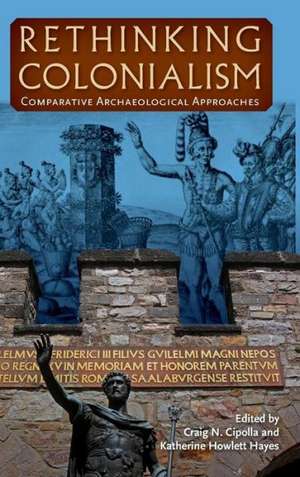Rethinking Colonialism: Comparative Archaeological Approaches
Editat de Craig N. Cipolla, Katherine Howlett Hayesen Limba Engleză Hardback – 25 mai 2015
Historical archaeology studies once relied upon a binary view of colonialism: colonizers and colonized, the colonial period and the postcolonial period. The contributors to this volume scrutinize imperialism and expansionism through an alternative lens that rejects simple dualities and explores the variously gendered, racialized, and occupied peoples of a multitude of faiths, desires, associations, and constraints. Colonialism is not a phase in the chronology of a people but a continuous phenomenon that spans the Old and New Worlds. Most important, the contributors argue that its impacts--and, in some instances, even the same processes set in place by the likes of Columbus--are ongoing. Inciting a critical examination of the lasting consequences of ancient and modern colonialism on descendant communities, this wide-ranging volume includes essays on Roman Britain, slavery in Brazil, and contemporary Native Americans. In its efforts to define the scope of colonialism and the comparability of its features, this collection challenges the field to go beyond familiar geographical and historical boundaries and draws attention to unfolding colonial futures.
Preț: 476.03 lei
Preț vechi: 560.04 lei
-15% Nou
Puncte Express: 714
Preț estimativ în valută:
91.09€ • 95.10$ • 75.39£
91.09€ • 95.10$ • 75.39£
Carte tipărită la comandă
Livrare economică 05-19 aprilie
Preluare comenzi: 021 569.72.76
Specificații
ISBN-13: 9780813060705
ISBN-10: 0813060702
Pagini: 266
Dimensiuni: 152 x 229 x 19 mm
Greutate: 0.56 kg
Editura: University Press of Florida
ISBN-10: 0813060702
Pagini: 266
Dimensiuni: 152 x 229 x 19 mm
Greutate: 0.56 kg
Editura: University Press of Florida
Descriere
The editors have brought together archaeologists specializing in Old and New World colonialism, both ancient and modern, to explore colonial consequences by engaging in dialogue with one another over consumption practices, diaspora and movement, representations of time, and archaeology's connection to descendent communities in contemporary practice and interpretation.
